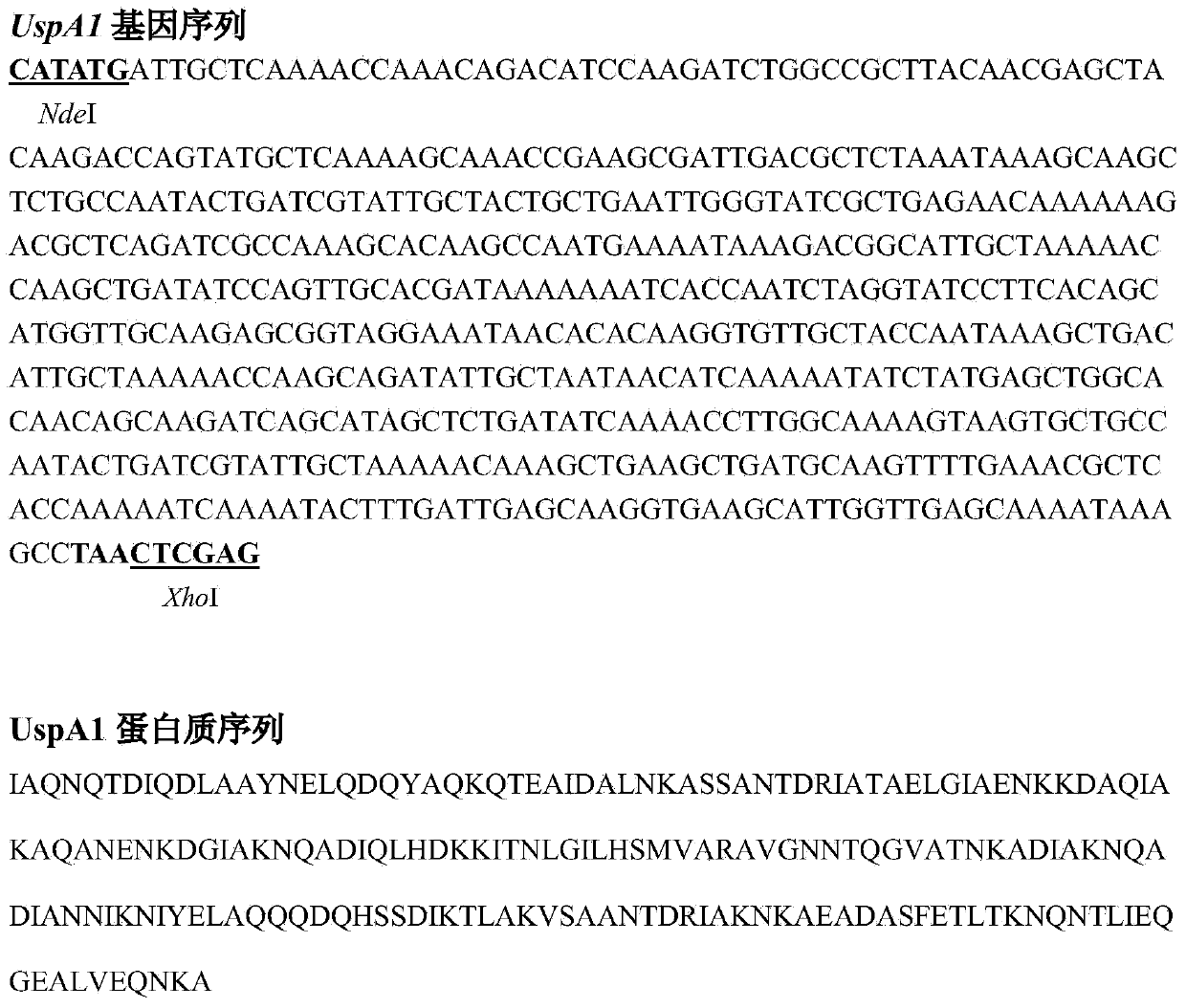Method and kit for performing quick co-detection on anti-Mc (Moraxella catarrhalis) IgM (Immunoglobulin M) and IgG (Immunoglobulin G) antibodies based on magnetic separation and multi-color quantum dot labeling
A magnetic separation and quantum dot technology, applied in the field of medical detection, can solve the problems of inconvenient and fast detection, low specificity and sensitivity, and missed diagnosis of patients.
- Summary
- Abstract
- Description
- Claims
- Application Information
AI Technical Summary
Problems solved by technology
Method used
Image
Examples
Embodiment 1
[0076] Example 1 Expression, purification and renaturation of recombinant UspA1-His fusion protein
[0077] 1. Cloning of related genes
[0078] Bioinformatics analysis was carried out on the surface protein UspA1 of Moraxella catarrhalis (the accession number in the NCBI protein database is AAF36416), to obtain the peptide with the most abundant antigenic epitope in its extracellular conserved domain, and to find its corresponding DNA code At the same time, the whole gene sequence was chemically synthesized after introducing the restriction site NdeI at the 5' end, the termination signal TAA and the restriction site XhoI at the 3' end (the whole sequence synthesis was completed by GenScript Biotechnology Co., Ltd., and the delivery When the artificially synthesized gene fragment was connected to the vector pUC57), it was denoted as UspA1. The full sequence of its gene is shown in the sequence listing. Specifically, the protein sequence encoded by the UspA1 gene is 522-710aa...
Embodiment 2
[0088] Example 2 Preparation of Anti-Moraxella catarrhalis Antibody Capturing Nano Magnetic Beads
[0089] 1. Optimization of reaction conditions for recombinant UspA1-His fusion protein coupled to magnetic beads:
[0090] Using the magnetic beads coupled with the recombinant UspA1-His fusion protein as the solid phase carrier, the mouse anti-human IgM monoclonal antibody labeled with quantum dots as the detection antibody, detect the anti-Moraxella catarrhalis IgM antibody positive serum, observe the magnetic beads and recombinant protein coupling. A series of optimization options were carried out on the particle size of the magnetic beads, as well as the concentration of EDC / NHS activator, the concentration of conjugated antibody, the coupling time, and the type of blocking agent.
[0091] 1.1 Selection of magnetic bead size
[0092] Select carboxyl nano-magnetic beads with a particle size of 50nm, 180nm, 350nm, 1150nm, and 3μm, add PBS buffer containing 4mg / ml EDC and 4mg...
Embodiment 3
[0104] Example 3 Preparation of anti-human IgM and IgG nanoprobes labeled with multicolor quantum dots respectively
[0105] 1. Optimization of the reaction conditions for nanocarboxyl quantum dot-labeled mouse anti-human IgM monoclonal antibody:
[0106] 1.1. Determination of the optimal labeling pH of the carboxyl quantum dot-labeled antibody probe
[0107] The pH of the phosphate buffer in the labeling reaction was set to 5, 6, 7, 8, and 9 respectively, and the fluorescence intensity of the labeled product was measured with a full spectrometer, and the influence of different pH values on the coupling reaction was observed, and the quantum dot-labeled monoclonal antibody was determined. The optimum pH for the reaction is 7.0-8.0. This experiment chooses pH7.4.
[0108] 1.2. Determination of the optimal labeling amount of carboxy quantum dot-labeled antibody probes
[0109] Set the ratio of the molar concentration of quantum dots to the concentration of monoclonal antibo...
PUM
| Property | Measurement | Unit |
|---|---|---|
| particle diameter | aaaaa | aaaaa |
| strength | aaaaa | aaaaa |
| particle diameter | aaaaa | aaaaa |
Abstract
Description
Claims
Application Information
 Login to View More
Login to View More - R&D
- Intellectual Property
- Life Sciences
- Materials
- Tech Scout
- Unparalleled Data Quality
- Higher Quality Content
- 60% Fewer Hallucinations
Browse by: Latest US Patents, China's latest patents, Technical Efficacy Thesaurus, Application Domain, Technology Topic, Popular Technical Reports.
© 2025 PatSnap. All rights reserved.Legal|Privacy policy|Modern Slavery Act Transparency Statement|Sitemap|About US| Contact US: help@patsnap.com



